- Home
- Rick Yancey
The Seal of Solomon Page 7
The Seal of Solomon Read online
Page 7
“Do you know what’s in the Lesser Seal?” I asked her.
She nodded, and her eyes were wide and wet-looking, and I wondered if that meant she was as scared as I was.
“Well,” I said. “What is it?”
“The worst thing,” she whispered. “The worst thing in the world.”
At that moment Op Nine abruptly slammed the big book shut and stood up.
“We’re at T-minus fourteen-thirty,” he announced. “Insertion is approximately one hundred kilometers from the nexus. We will approach on sand-foils, since no doubt the Hyena is expecting an aerial assault. SATCON INTEL has identified Bedouin tribesmen recruited by our target.”
“How many?” one of the guy agents asked. He had a great tan. I wondered if he was one of the people posing as a tourist above deck on the Pandora.
“Upwards of fifty, perhaps more, stationed as recons along approachable routes. Including, presumably, our route.”
Op Nine opened one of the overhead compartments and pulled out something that looked like a cross between an elephant gun and a rocket launcher. It had a black strap for hanging it over your shoulder and a telescopic sight.
“Now,” he said. “In the case of a full-blown intrusion event, this is the CW3XD.” He held it high over his head so everybody could get a good look. “Obviously, it has never been field-tested.”
“No time like the present,” the tanned agent muttered.
Op Nine ignored him. “The magazine holds fifty rounds of ordnance.” He pulled an oversized clip of bullets from the same overhead compartment. He ejected one of the bullets and held it up. It looked like an ordinary rifle round, except the tip was larger, about the size of an olive. “Be extraordinarily cautious with these. Loss of one into unfriendly hands could result in complete MISSFAIL.”
“Mission failure,” Ashley translated for me, but I had already figured that one out.
“The CW3XD is designed solely for containment of intrusion agents,” Op Nine said, his tone becoming stern. “Under no circumstances is it to be discharged at the Hyena and his forces.”
“Why?” another agent demanded. He was the biggest one of the lot; his thighs bulged in the shiny OIPEP jumpsuit and his biceps were about the size of my head, which, like too many people have pointed out, was large. “One round from this bad boy and they’ll never find all the pieces.”
“The ordnance is limited,” Op Nine said.
“Extremely limited,” Abigail Smith added, and for some reason she looked across the aisle at me.
“And it is specifically designed for operation against an intrusion agent,” Op Nine said.
“So it’ll kill ’em?” the big agent asked.
Op Nine gave him a cold stare. “What has never lived cannot be killed. Theoretically, the CW3XD will inhibit the IAs, giving us time to retrieve the Seals from the target.”
Op Nine nodded to Abigail, who took a deep breath and rose from her seat with an air of weariness, like she could actually feel the fate of the world resting on her shoulders.
“Let’s gear up,” she said, and I thought her voice shook a little, and that wasn’t encouraging, a senior OIPEP agent, afraid.
16
The agents stood up and popped open the overhead compartments, pulling out these yellow and orange bundles with white harnesses and clinking silver buckles. It took me a second to get it. This plane wasn’t landing. Instead, we were jumping. My stomach did a slow roll.
Ashley touched me on the elbow. “You need some help with yours?” she asked.
“Yeah,” I said.
“Turn around.”
I turned my back to her and she slipped the harness over my shoulders. I turned again and she proceeded to snap the silver buckles closed. The top of her head was below my chin as she worked on the buckle at my waist, and her blond hair shimmered in the cabin lighting. I smelled lilacs. She gave each buckle a sharp tug before stepping back.
“The chute should automatically deploy after seven seconds,” she told me. She touched a cord hanging over my left shoulder. “Pull the backup if it doesn’t.”
“What if the backup doesn’t work?”
“It’ll work.”
“But what if it doesn’t?”
“Then you hit the ground at five hundred miles per hour.”
She turned away and rummaged in the overhead. Four agents fussed with the big crates in the middle of the hold, unhooking the heavy chains and checking the mattress-sized parachutes tied to them.
“When you say seven seconds, is that seconds like ‘one-Mississippi, two-Mississippi’ or ‘one thousand one, one thousand two’?” I asked.
She turned, holding a gun and holster. She wrapped it around her slim waist and pulled it tight.
“It’ll be all right, Alfred,” she said. “Just don’t stiffen up on the landing. Remember to bend your knees on touchdown; you’ll be okay.”
A bell rang inside the hold and a yellow light began to pulse over the cabin door. All the agents except two lined up for the jump. These two took positions in the rear on either side of the massive bay door; I guessed they were in charge of deploying the crates. I wondered who was in charge of deploying Alfred Kropp.
The agents lined up by the pulsing yellow light were hooking these long metal cords dangling from their chutes to a thin pole that ran the length of the cabin. I was wondering why, when the door swung open and a tornado roared into the plane. The wind kicked my feet out from under me and I would have smacked butt-first onto the hard metal floor, but a pair of huge hands caught me before I hit.
Op Nine shouted into my ear: “Be careful, Alfred Kropp! There may not always be someone near to catch you when you fall!”
He hooked me to the pole. I shivered in the howling wind. The temperature must have dropped about ten degrees when the door swung open.
One by one the OIPEP agents vanished through the opening. One second they were standing there, the next they were gone, like they were being sucked into the maw of an angry, screaming beast. Op Nine put one hand on my shoulder as we edged closer. My knees felt very weak and my throat very dry, but I didn’t have a choice now—I couldn’t turn back or change my mind, and sometimes that’s better.
When my turn came, I put a hand on either side of the opening and stared into the dark Arabian night, unable to look up or down or unclench my cramping fingers from the cold metal. Op Nine bellowed in my ear, “Now! Let go, Alfred!”
That was it, the whole deal. I really had a problem with this letting-go thing. My mom. The truth about my dad. The loss of everybody who was close to me. I suddenly realized that sometimes the toughest thing is getting out of your own way.
I let go.
17
I spun and twisted and flipped as I fell, yowling my lungs out. The big plane appeared to shoot straight up toward the stars, and the world fragmented and refused to arrange itself into any kind of order: stars, earth, earth, stars, stars, earth, earth . . . and my mind fell apart with it. I forgot to count and by the time I remembered, I had no idea where to start—how many seconds had passed? Should I pull my cord just to be safe? Or would pulling my cord mess up the timing mechanism and tangle my chute? And, if my chute got tangled, would the desert sand break my fall? But if desert sand could break someone’s fall, why use a parachute in the first place?
I hadn’t been counting, but I figured I was way past the seven-second window, so I pulled the cord. Nothing happened. Stars, earth, earth, stars—and nothing happened. I yanked the cord again. I should know better than to jump from airplanes. In fact, with my track record, I shouldn’t even indulge in something as commonplace as jaywalking. I pulled the cord a third time.
Nothing happened. Well, one thing happened: the rip cord broke off in my hand.
A few seconds later I was yanked about fifty feet straight up as my chute deployed and my descent slowed—but didn’t seem slow enough. At least I was falling feetfirst. I could see one or two other OIPEP troopers silhouetted against the sky,
dangling from their chutes like the toys I used to buy—the green army men with the plastic parachutes that you threw underhanded into the air. Half the time the kite string didn’t unravel correctly and the army man crashed to earth or got hung up in a tree branch.
I looked down between my feet and saw the desert rushing up. Bend your knees, Kropp, keep ’em loose, I told myself, but I smacked into the ground with my legs as stiff as one of those army men’s. My right ankle twisted in the sand. I pitched forward and the chute settled gently over my writhing body, the silky material wrapping tighter and tighter around me as I rolled in the sand.
Somebody pulled the chute off me and rolled me over. I looked up into Ashley’s face—her red lipstick looked purple in the starlight—and said, “I think I broke my right ankle.”
“Let’s see,” she said softly. She ran her fingers along the bones and then took my foot in both hands and gently turned it.
“Ouch!”
“I think it’s a sprain. Let’s see if you can put any weight on it.”
She unhooked me from the harness and pulled me to my feet.
“Put your foot on the ground, Alfred,” she said.
“Ouch!”
About a hundred feet away the agents were busy with the crates—or what was left of them. They had broken apart on impact; slats lay scattered in every direction.
Op Nine came up, frowning.
“Kropp is hurt?” he asked.
“Not badly,” Ashley said. “A sprain, I think.”
Op Nine said to Ashley, “Kropp rides with you.”
He trudged toward the other agents gathered around the remnants of the crates. We trailed behind, my arm draped over Ashley’s neck, my foot dragging in the sand. In every direction dunes marched like oceanic waves, disappearing into the horizon. I had thought the stars very bright on the shores of the Red Sea, but here in the desert they seared the blackness around them.
“Where exactly are we, anyway?” I asked Ashley.
“The Sahara.”
The agents had pulled twelve snowmobiles from the shattered crates and were going down some kind of checklist, getting them ready, I guess, only there wasn’t much chance of a snowstorm in the desert. One agent was handing out the CW3XDs and clip belts that they threw over their shoulders, reminding me of Mexican bandits. Abby Smith stood by herself a few feet away, holding some electronic gadget with a bluish LCD glimmering on her frowning face.
“What’s the deal with the snowmobiles?” I asked.
“They aren’t snowmobiles,” Ashley replied. “Well, they used to be. They’ve been modified. We call them sand-foils.”
Instead of the ski pads, these had thin metal blades, the sharp edge facing down. Someone handed Ashley a helmet and she passed it to me.
“Put this on, Alfred. A sand-foil’s top speed is a hundred and fifty miles per hour. Do you know what a single grain of sand can do if it hits you at that speed?”
“No, but I got hit with a baseball once that must have been going forty miles per hour; it hurt like heck.”
I shoved the helmet down over my head. I could have guessed it would be too small, and it was. One of my ears was folded down.
Abby snapped her device closed and trudged over to us.
“We’re approximately a hundred clicks due east of the target,” she said crisply. Her voice sounded very far away inside my helmet. “Remember, no wake-riding and no unauthorized firing of the 3XDs. Op Nine and I are on the point. Any questions?”
Nobody had any questions or, if they did, they weren’t going to waste time asking them. All the agents except Ashley flipped the big CW3XDs onto their backs. Ashley had to ride with hers awkwardly resting across her chest, since she had my big self awkwardly clinging to her back. Static popped in my ear and suddenly her purry voice seemed to enter my head and lodge in the middle of my brain. The helmets were outfitted with a wireless setup.
“You okay?”
“I guess.”
She pressed a button on the console in front of her and indicator lights blinked on. I didn’t hear the engine roar to life like I expected; the thing simply started to vibrate beneath me.
“Hang on!” she said. I wrapped my arms around her waist as the sand-foil leaped forward and accelerated, the blades rising out of the sand as it gained speed. These sand-foils were clearly not made for two riders. My butt hung about halfway off the back of the leather seat and I worried about a stray grain of sand embedding itself into the softest part of my body.
Looking over her shoulder, I could see the speedometer. The needle hovered just below the one hundred mark.
Abigail Smith had said we were due east of the target, which meant we must have been heading west, but the dunes ran roughly north-south, so our race across the Sahara was run half of the time in the air, as we crested one wave, became airborne, and then smacked back down in a trough before starting up the next dune.
The ride across the desert was like being on a roller coaster. Those rides always seemed to last longer than they really were. I raised my head and looked over Ashley’s shoulder.
The other agents had already stopped. Straight ahead the horizon glowed a brilliant amber with little sparks flying around in the orange like sunlight reflecting off the tips of waves.
We slowed to a stop and I slipped off, fumbling with the chin straps of my helmet. I yanked it off, wincing as it scraped over my ears. I could see Op Nine standing a few yards in front of the rest of the group, studying the glowing horizon like he’d never seen a sunrise before.
“What’s up?” I asked Ashley, but she just shook her head. I trudged through the sand toward Op Nine, dragging my bum foot. The glow on the horizon had deepened to an orangish red. But something about this desert sunrise wasn’t right, and it took me the rest of the hike to figure it out: we were facing west, not east.
This was no sunrise.
Abby Smith was a few steps ahead of me and Op Nine must have heard her coming up, because she was still behind him when he turned his head and spoke.
And now the glow on the horizon looked like a wall of fire coming toward us.
“We are too late.”
18
“How many?” Abby asked Op Nine.
“It’s difficult . . .” He shaded his eyes with one huge hand and squinted toward the sparkling light. “Thirty, perhaps forty legions.”
“Legions?” I asked. “What’s a legion?”
Abby said to him, “Not all, then.”
He shook his head. “A search party.”
“A search party of what?” I asked.
“Can we outrun them?” she asked.
He said quietly, “ ‘Their horses are swifter than leopards, and are more fierce than the evening wolves: and their horsemen shall come from far; they shall fly as the eagle that hasteth to eat.’ ”
“I’ll take that as a no,” she said. “Then we engage.” She started to turn away. He grabbed her arm and pulled her back.
“No!” he said in a fierce whisper. “Our mission is to acquire the target. There is still time.”
“Time for what?” I asked, but I really didn’t expect an answer by this point.
Now the orange on the horizon had deepened to a fiery red mixed with bright white sparks. The stars winked out as the burning light advanced, filling the night sky, and a breeze noticeably warmer than the cool desert air began to blow across our faces.
“We must take cover,” Op Nine said. “Immediately.”
Abby turned and started toward the others, making some kind of complicated hand signal as she went, and right away they opened the storage compartments on the foils and began pulling out what looked like brown tarps.
Op Nine had said we needed to take cover immediately, but he didn’t move a muscle. He stood stock-still and stared at the flickering lights of white and gold. The breeze had turned into a full-fledged wind that grew hotter with each passing second. The ground started to tremble.
“Uh, Op Nine, didn’t you
say we had to take cover?”
He shook his head as if rousing himself from a dream.
“Yes. Come, Kropp.”
He threw my arm over his shoulder and helped me back to the foils. The agents had spread the brown tarps over the vehicles and now were crawling underneath them. Ashley crouched beside one, motioning to us.
“Alfred,” Op Nine said. “This is very important: do not look into their eyes. They will know what you fear.”
He lowered me to the ground and I started to crawl under the tarp. He grabbed my arm and pulled my face close to his.
“And what you love.”
He had to shout over the wind, which was howling by this point, spraying us with stinging grains of sand. He let the tarp fall and I felt someone’s hand on my wrist, pulling me away from the edge.
“Don’t move,” Ashley whispered. “Don’t talk.”
The darkness under the tarp faded, or maybe I was getting used to it, because after a minute I could see her bright blue eyes darting back and forth. Ashley’s hand was white-knuckled on the CW3XD that lay across her lap, her index finger caressing the trigger. Ashley was afraid.
The tarp rippled and snapped around us as the gale worsened and sand popped against the material, making this strange hissing sound like gas escaping from a bottle. I could hear something else too, as if the wind was a curtain rippling as this sound passed behind it. Voices, or maybe not voices but somehow the echo of voices, and I started to shake as the tarp around us began to glow red.
It was very close now, whatever it was, and the closer it got, the more I shook. It was hot and stuffy under the covering and I was sweating, but I shivered like I had a fever. Op Nine’s warning echoed over and over in my head: Don’t look into their eyes! Don’t look into their eyes! My mind became like a slice of Swiss cheese, stretched thin, full of holes filled with darkness, and that darkness was full of horror.
Dimly, under the howling wind, I could hear someone screaming. She needs to be quiet, I thought. Ashley, be quiet! But it wasn’t Ashley screaming, of course; it was me.
Then, as if it shot through one of those holes in my mind, a hand reached for me in the darkness, soft and warm, and without thinking I pulled her into my arms.

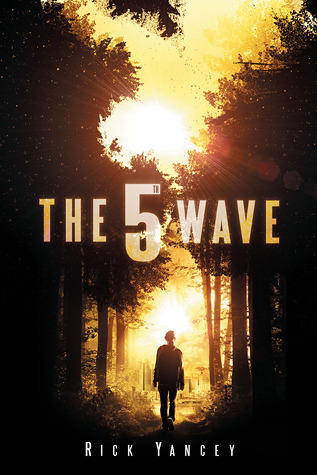 The 5th Wave
The 5th Wave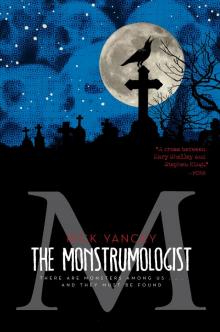 The Monstrumologist
The Monstrumologist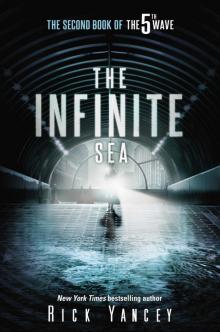 The Infinite Sea
The Infinite Sea The Curse of the Wendigo
The Curse of the Wendigo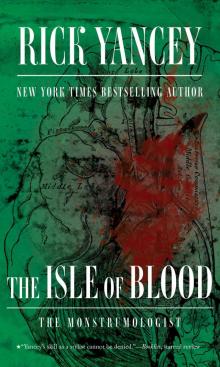 The Isle of Blood
The Isle of Blood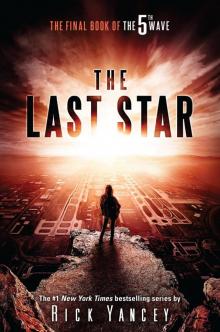 The Last Star
The Last Star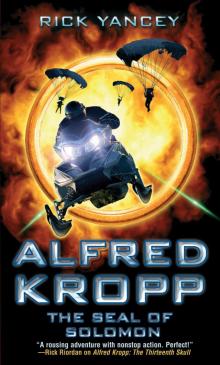 The Seal of Solomon
The Seal of Solomon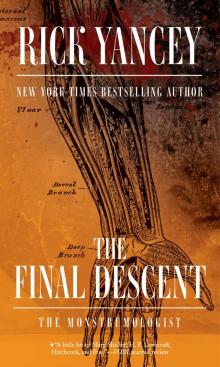 The Final Descent
The Final Descent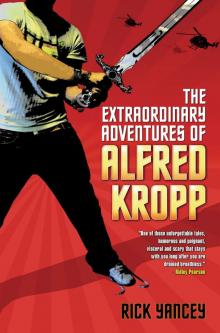 The Extraordinary Adventures of Alfred Kropp
The Extraordinary Adventures of Alfred Kropp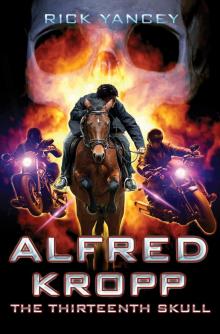 The Thirteenth Skull
The Thirteenth Skull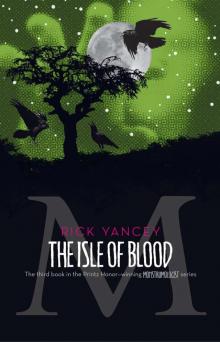 The Isle of Blood (Monstrumologist)
The Isle of Blood (Monstrumologist)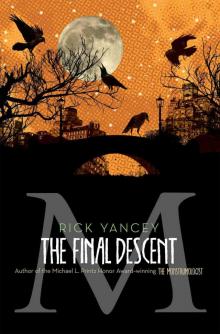 The Final Descent (The Monstrumologist)
The Final Descent (The Monstrumologist)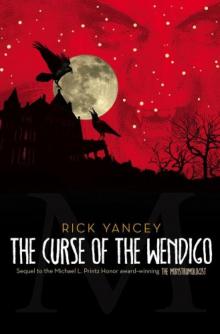 The Curse of the Wendigo (The Monstrumologist, Book 2)
The Curse of the Wendigo (The Monstrumologist, Book 2)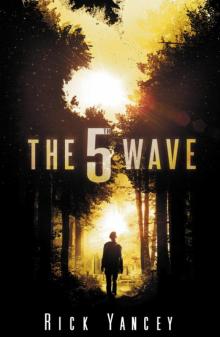 The 5th Wave t5w-1
The 5th Wave t5w-1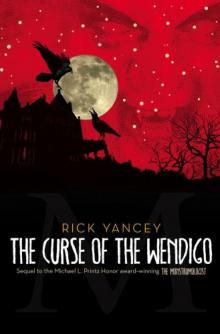 The Curse of the Wendigo (The Monstrumologist, Book 2) m-2
The Curse of the Wendigo (The Monstrumologist, Book 2) m-2